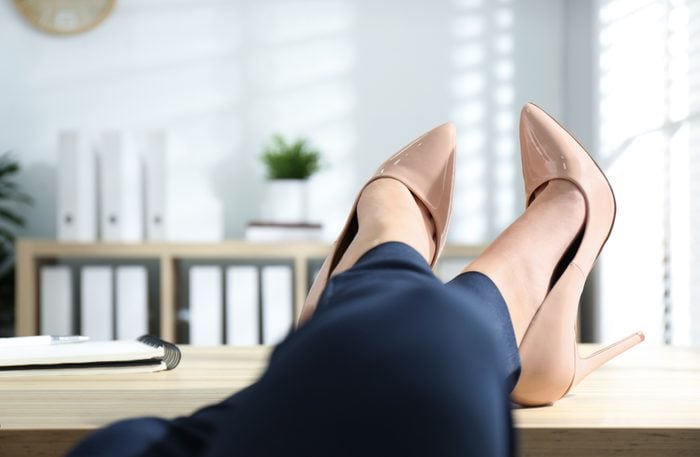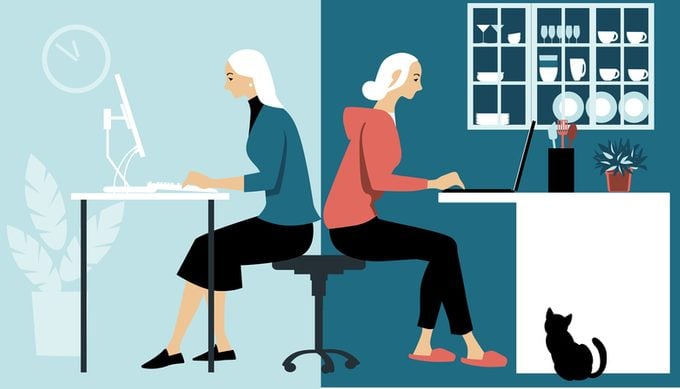Lazy-Girl Jobs Are Trending with Gen Z—Here’s How to Find One
Updated: Nov. 23, 2023

Lazy-girl jobs aren't actually lazy—and they're not just for girls. Here's what you need to know, according to career experts.
Wish you could find a job that pays well but doesn’t take over your life? Who doesn’t? The pandemic reminder that there’s more to life than work has sparked numerous career trends, from quiet quitting to rage applying. Gen Z, in particular, isn’t afraid to put it all on the line to change careers to find something better, and it’s sparked the latest TikTok trend: lazy-girl jobs.
“Like the quiet-quitting phenomenon, the #lazygirljob trend is another example of employees wanting to push back on toxic workplace cultures that encourage working long hours, always being on and putting up with poor managers,” explains workplace expert Michelle King, PhD, former Director of Inclusion at Netflix and author of the forthcoming book How Work Works: The Subtle Science of Getting Ahead Without Losing Yourself.
Kristi Coulter, author of the forthcoming Exit Interview, a memoir about her 12-year stint as an Amazon executive, knows a few things about toxic workplace cultures. For 12 years, she did the work of two to three people, which meant seven-day workweeks and trying to stay afloat in a fear-based culture. As for the lazy-girl job trend, she notes, “obviously, the word lazy is used tongue-in-cheek, because what they’re describing is actually work-life balance.”
So, what does a lazy-girl job look like—and how can you find one? We spoke to career experts to find out.
Get Reader’s Digest’s Read Up newsletter for more career insights, humor, cleaning, travel, tech and fun facts all week long.
What is a lazy-girl job, exactly?

“A lazy-girl job is any job that can be done from home within the standard 9-to-5 and has undemanding tasks and easygoing managers,” King explains. “The jobs pay enough money ($60,000 to $80,000) for a young adult to live off but not feel pressure to work above their contracted hours.”
The term was coined in May 2023 by Gabrielle Judge, a 26-year-old career influencer. Judge told The Wall Street Journal that she was aware the word lazy would have a negative connotation, but she wanted to spark a conversation. “Lazy-girl jobs aren’t roles where you can slack off,” she said, “but career paths where your work-life balance should feel so awesome that you almost feel like you’re being lazy.”
Why are lazy jobs so popular with Gen Z?
Every generation has its own workplace culture and vibe, and there are dozens of funny work memes that show the differences between the way boomers, Gen X, millennials and Gen Z approach everything from 8 a.m. Zoom meetings to taking vacation days. Gen Z is pretty relaxed about all of it.
“New ways of working are always appealing to younger generations, particularly for a generation like Gen Z that’s more vocal about creating work-life balance,” says career expert Akhila Satish, CEO of Meseekna, a company that assesses and improves employee performance. “Plus, the younger generation hasn’t seen their peers or themselves benefit from resilience and discipline in a job long-term, so it’s easier to focus on the immediate gratification of having a less-demanding role.”
Are Gen Z women the only ones interested in this trend?
Despite the gender-specific implication of lazy-girl jobs, men are also looking for more life-work balance. But, really, who isn’t? King points to a 2023 survey by the consulting firm Deloitte, which found that nearly half of Gen Z (46%) and four in 10 millennials (39%) say they feel stressed or anxious at work all or most of the time. “Any individual, regardless of gender, can want and find this type of role,” King says. “This isn’t something that women alone want. It’s just more socially acceptable for women to talk about it because of gender stereotypes.”
Pros of a lazy-girl job

The biggest benefits are work-life balance and, essentially, a better life. Of course, that latter concept is subjective and boils down to your priorities. Some people want to own a home, take several vacations a year and send their kids to private school. Others want more freedom or, as some say, “to live a life they don’t need a vacation from.”
Lazy-girl jobs fit the bill because they provide more control, flexibility and freedom, according to Bridget Lohrius, founder and CEO of the career-coaching company Sandwina. “Hustle culture is anathema to Gen Z,” she adds, “and they’re not afraid to say so.” Aside from being less demanding, these jobs also tend to align with a person’s values, prioritize personal growth and promote mental and physical well-being. Next, read these work-life balance quotes to inspire and celebrate healthier boundaries at work.
Cons of a lazy-girl job
Some experts say that seeking a lazy-girl job (and then flaunting it) is bad for career progression. But Coulter notes that “not everyone wants to be CEO” and that it’s more than OK to be “quietly excellent.”
The problem? When you’re not as invested in your job, you may lose something in the process. “The challenge I have with this trend is recognizing that most of us still want our work to be meaningful,” King says. “For work to be meaningful, we need to identify our contribution beyond the tasks we perform or the results we achieve.” If you can find meaning in your lazy-girl job, that’s ideal. If not, you may want to reevaluate.
How do you find a lazy-girl job?

Jobs with the best work-life balance tend to be remote or hybrid, and you can zero in on these opportunities by using job-search filters on LinkedIn. “One in seven jobs offer hybrid work, and one in 10 is remote,” says LinkedIn career expert Andrew McCaskill, “with professional services, financial services and tech and media seeing the biggest increases in hybrid job postings this year.”
This, of course, does not mean that remote and hybrid jobs are easy-peasy gigs you can phone in (or, rather, Zoom in). McCaskill notes these jobs can still be important, dynamic and demanding, but they do tend to afford you more independence. They also allow you to cut down on commute time and office distractions, and set boundaries. And you won’t have a manager breathing down your neck—at least in a literal way.
An important note
Think you’ve found the right gig? Not so fast. “Once you’ve found a job that looks like it aligns with your needs, it’s important to ask the right questions during the interview process to determine whether a company will indeed offer you the flexibility and autonomy you’re looking for,” McCaskill says. Translation: Look out for some interview red flags to make sure your job description actually matches up with your dreams of a “lazy” workweek.
It’s also a good idea to review your life and career goals periodically, making your choices continue to serve you and make you happy. “Keep in mind that lazy-girl jobs can look different for everyone,” says McCaskill, “so knowing what works best for you—your current needs and your long-term career goals—is key.”
About the experts
- Michelle King, PhD, is a workplace expert, the former Director of Inclusion at Netflix and the author of How Work Works: The Subtle Science of Getting Ahead Without Losing Yourself.
- Kristi Coulter is the author of Exit Interview, a memoir about her 12-year stint as an Amazon executive.
- Akhila Satish is an award-winning career expert, a scientist and the CEO of Meseekna, where she has worked with employers such as the U.S. Department of Defense, NASA, Eli Lilly and Credit Suisse to assess and improve employee performance.
- Bridget Lohrius is the founder and CEO of Sandwina, a platform built to close the gender gap faster by making career coaching more affordable and accessible for women.
- Andrew McCaskill is a career expert for LinkedIn.



